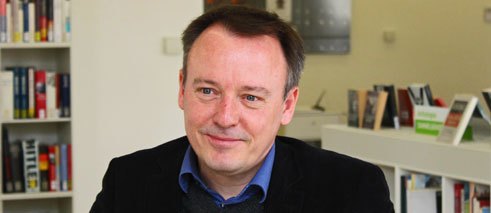Interview with Mirko Bonné
"Literature should not be exploited"

In 2013 Mirko Bonné made the shortlist for the German Book Prize with his novel Night No More and is currently travelling around the world as a writer in residence for the Weather Stations – an international project which organises literary discussions on the topic of climate change.
Goethe-Institut: What do you believe still needs to be done in order to raise more awareness of issues such as global warming?
Mirko Bonné: My impression is that people are aware of the issue. There is lots of talk of global warming and climate change. But there is also a sense of increasing powerlessness, helplessness and perplexity, which I’m not sure we should be contributing to. And that is the whole crux of the problem – no one really knows what to do.
Goethe-Institut: You travelled to Dublin, Melbourne and London for the Weather Stations Project. Were there any differences in the audiences’ responses?
Mirko Bonné: Some of the things I experienced in Melbourne, I am encountering again in London. A very rigorous, youthful way of dealing with the issue of waste in our throw-away society. It is very noticeable. Back in Hamburg we still don’t have the same degree of consciousness when dealing with resources and commodities. Upon closer inspection you can see that we ought to be more careful and not dispose of everything so inconsiderately.
As an author, and particularly as a poet, I have to start by making my position clear. I am neither a sociologist nor a politician dealing with environmental issues. I concern myself with language. And in that respect I am not sure how I can contribute to the climate change debate other than by drawing attention to reprehensible language-related developments.
Last night we were provided with a great example of the abysmal depths of this issue. Jay Griffith’s question regarding the exhibition’s sponsor, Shell, and Chris Rapley’s response in his capacity as exhibition organiser – it was truly fascinating to see how much energy was suddenly unleashed on the podium. People started calling a spade a spade! But the topic is generally very complicated because there can no longer be a distinction between good and evil, black and white. And yet all of us are expected to take a stance.
Goethe-Institut: Was that the case in all countries or are there different approaches to climate change?
Mirko Bonné: It is definitely a far more explosive issue in Australia. The effects of climate change are already quite obvious there, in many different regions. And then you have a government that claims it’s all nonsense and goes through with radical deforestation. If things carry on in that way, it is easy to imagine what Australia will look like in 50 years time: a scorched continent.
Goethe-Institut: Do you believe discussions about climate change are the prerogative of certain social groups?
Mirko Bonné: We are talking about barely more than five or ten per cent of the educated classes. The rest of society couldn’t care less what happens to the environment. And in my opinion there’s little we can do about it, since most people have other problems to deal with. That will probably change when severe problems start occurring. Let’s hope it doesn’t happen, but it seems unavoidable that violent storms, heavier floods and other natural disasters will become more frequent.
Goethe-Institut: What is your view from a literary standpoint? How was meeting other authors taking part in the Weather Stations Project and engaging in an international dialogue with them on the issue of climate change?
Mirko Bonné: Each of the five authors involved has an entirely different approach. There are no similarities to speak of – save maybe for the compassion with which we consider problems in Ireland or Poland or in other foreign cultures and languages. For instance, we were all fascinated by the Australian aborigines we got to meet, by museums we visited in Melbourne, by landscapes that were shown to us. But what will come of these individual impressions will of course be entirely different.
Irish author Oisín McGann for example sees things through the eyes of a science fiction reader. I find that fascinating, yet my approach is entirely different. When we discuss poetry, we both get a sense of the wide range of different literary canons. Tony Birch from Melbourne rarely writes poetry; however we share a rather poetic perception of the world, also because he has an indigenous background and takes keen interest in traditional tales. Something I also feel close to. We should embrace these differences because they’re what will make this project beautiful.
Goethe-Institut: Is literature as an art form an adequate way of getting issues like climate change across?
Mirko Bonné: No, literature the way I perceive it should not be exploited. Nevertheless, I would say that any self-respecting author who appreciates our world’s diversity would do well to deal with the topic. And by that I don’t mean with its scientific dimension! But rather talk to schoolchildren about their fears or how they view nature. I wouldn’t say that literature or even the arts in general are particularly appropriate in dealing with this issue. But discussion is. And this discussion has to be kept alive at all costs. That, and nothing else, is literature’s duty.